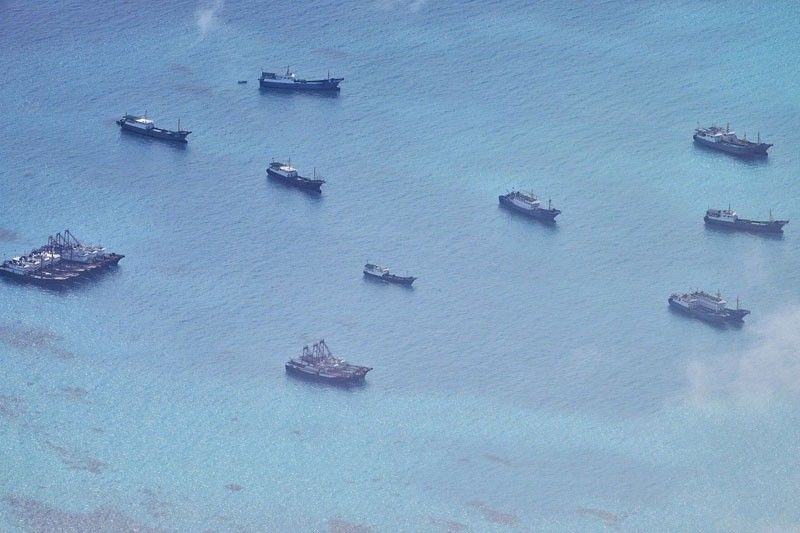AFP, PCG boost patrols vs Chinese ships in West Philippine Sea

MANILA, Philippines — The Philippine Coast Guard (PCG) and the Armed Forces of the Philippines (AFP) will intensify patrols in Iroquois Reef after 48 Chinese militia vessels were sighted near the area in the West Philippine Sea (WPS).
“We intend, with the guidance and approval of the commandant of the PCG, Admiral Artemio Abu, we would deploy two PCG vessels to follow up, to drive the Chinese maritime militia away from the Iroquois Reef,” PCG-WPS spokesperson Commodore Jay Tarriela told radio dzBB yesterday.
“(The Chinese militia’s usual strategic objective) is to occupy a particular maritime feature, to swarm the area for a very long period of time, and if you fail to notice them then they would increase their numbers eventually,” Tarriela explained.
The 48 Chinese maritime militia in Iroquois Reef were spotted last June 30, according to the AFP.
Tarriela recalled that when Chinese militia vessels swarmed Sabina Shoal last March, the PCG deployed two ships.
“We have noticed that once we publicize this kind of swarming activity, the Chinese maritime militia would become compliant when we ask them to leave. This is because we made the public aware of their swarming activity, and they would be condemned by the international community. Embassies would be speaking out to criticize these kinds of activities of China,” Tarriela said.
“That is why when we deploy our government assets, they would leave the area. They are driven away immediately,” he added.
The Iroquois Reef and Sabina Shoal, found in the southern part of Recto Bank, have “a lot of service contracts when it comes to oil exploration,” Tarriela said.
Iroquois Reef is approximately 128 nautical miles away from Palawan and falls within the country’s exclusive economic zone (EEZ).
C-17 Globemasters
Meanwhile, Sen. Imee Marcos questioned the presence of the United States Air Force’s C-17 Globemasters in Manila and Palawan.
“Too little is known about ongoing US military activity in our territory while we constantly call out the presence of Chinese vessels in the South China Sea,” Marcos noted.
“I am aware of ongoing exercises with foreign militaries this month. But the same zeal in tracking any violations in our maritime territory and EEZ must also apply where Philippine air traffic rules and joint military agreements with the US are concerned,” she added.
The Senate committee on foreign relations, chaired by Marcos, released a statement on July 9 after US flight planners failed to coordinate beforehand a military plane landing in Manila’s international airport last week.
Global flight tracker AirNav Systems revealed that a US Air Force C-17 with flight code MC244 / RCH244 landed in Manila on Friday morning after leaving the Andersen Air Force Base in Guam.
The C-17 then flew to Palawan before 1 p.m. and headed for Yokota Air Base in Fussa, Japan later in the afternoon.
Commercial flight passengers at the Ninoy Aquino International Airport also noticed two US military planes near the runway.
On Saturday, a C-17 with flight code RCH323 took off from Tokyo and flew toward Polillo Island before exiting the Philippine territory past 6 p.m.
Marcos called on military, defense, and foreign affairs officials to determine if covert US military flights aggravated the already tense situation in the South China Sea and Taiwan Strait.
China’s ‘irresponsible acts’
The US does not want the Association of Southeast Asian Nations (ASEAN) to adopt its views or choose a side, but to push back against “irresponsible acts” that China carried out over the past years.
“We have seen an upward trend of unhelpful and coercive and irresponsible Chinese actions in the South China Sea,” Assistant Secretary of State for East Asian and Pacific Affairs Daniel Kritenbrink said in a briefing on July 7.
“In our view, it’s not a matter of getting countries on board with the US view. It’s a matter of working with our ASEAN partners to advance our shared view and vision for the region,” Kritenbrink said.
“We’re not asking countries to choose. We’re simply ensuring that countries have choice and the ability to make their own sovereign decisions free from coercion. I think all countries in ASEAN want to make their own decisions. They don’t want to be pushed around or bullied by anyone,” he added.
Kritenbrink said the US will further strengthen the Comprehensive Strategic Partnership with ASEAN.
“We have a regional strategy of which China is a part, and not the other way around, and what that means is, our focus is on building our partnerships, strengthening our relationships, and that’s what we’ll continue to work on going forward,” Kritenbrink said.
Secretary of State Antony Blinken will visit Jakarta on July 13 and 14 to participate in the US-ASEAN Ministerial Meeting, the 13th East Asia Summit Foreign Ministers’ Meeting and 30th Annual ASEAN Regional Forum.
Modernize PCG
Sen. Bong Go filed Senate Bill No. 2112 to modernize the PCG.
“Our coast guard serves as the frontline defense against threats like smuggling and terrorism. Additionally, they provide invaluable assistance during natural disasters and emergencies,” Go said.
“However, our coast guard faces several challenges that hamper their effectiveness including outdated equipment, inadequate training, and insufficient funding. Hence, I am proposing this bill to address these issues and modernize our coast guard to better protect our country and our people,” he added.
If enacted into law, the PCG will undergo a comprehensive modernization program designed to eliminate accidents at sea, expedite response times during search and rescue operations, and bolster national security efforts.
“Moreover, this bill will establish a system of accountability and transparency in managing the coast guard’s resources and operations. It guarantees efficient and effective use of the allocated funds for the modernization of our coast guard,” Go said. — Cecille Suerte Felipe
- Latest
- Trending

































